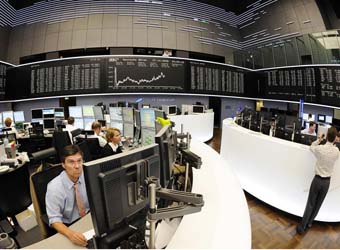European stocks closed higher on Monday following early losses after Italian Prime Minister Matteo Renzi lost a referendum to reform the country’s constitution.
The pan-European Stoxx 600 ended 0.56 percent higher with almost all sectors in positive territory.
Bank stocks fell more than 1.2 percent at the open but pared losses to close 0.76 percent higher at the end of the trading day. However, Italian banks – Unicredit, Banco Popolare and Banca Popolare di Milano were all near the bottom of the Stoxx 600 with the latter falling by more than 7.9 percent.
The Italian MIB had been trading flat for most of the session and ended the day down around 0.21 percent.
Meanwhile in the U.S., the Dow Jones industrial average hit fresh all-time highs yet again on Monday as investors digested comments from New York Federal Reserve President William Dudley.
“It doesn’t take a lot for the Dow to be at an all-time peak anymore. Another half a percent climb has seen the index break 19250 for the first time, continuing its astonishing post-election rise,” Connor Campbell, financial analyst at Spreadex told CNBC in a note on Monday.
Nearly 60 percent of Italian voters rejected the government’s proposal on constitutional reform. Renzi had said he would resign if the reform wasn’t approved by voters.
Investors are worried over the possibility of new elections in the third-largest euro economy and with the impact that the ongoing political instability will have for the fragile banking system.
The troubled Italian bank Monte dei Paschi di Siena is reportedly having to wait for another three or four days to find out whether a recapitalization plan of 5 billion euros ($5.29 billion) is to be implemented, according to Reuters sources. Its shares ended 4.2 percent down.
Unicredit is trying to sell its asset manager, Pioneer, to Amundi for about 3 billion euros. The deal would help the Italian bank to boost its capital ratios, the Financial Times reported. Despite such news, shares of Unicredit closed down by more than 3.3 percent.
Claus Vistesen, chief euro zone economist at Pantheon Macro, said in a note: “The economy could easily grind to a halt due to political uncertainty. It could also prevent urgent action on the country’s ailing banks. A deal with the EU on recapitalization can’t be postponed for much longer if Italian politicians want to avoid a sudden failure of one or more of the country’s mid-size banks.”
Credit ratings agency Standard & Poor’s said in a note that “the negative outcome of the referendum yesterday does not have an immediate impact on Italy’s creditworthiness as it does not have immediate implications for Italy’s economic or budgetary policies beyond likely near-term changes in Italian politics.”
The euro fell to a 20-month low during Asian trading but has since rallied to hit a two-week high against the dollar.
European finance ministers gathered in Brussels on Monday, but the Italian representative Pier Carlo Padoan cancelled his attendance.
Eurogroup President, Jeroen Dijsselbloem said Italy would need to take appropriate measures to reduce debt levels but that it is impossible to put any further pressure on the country given its current political instability.
Meanwhile in France, Prime Minister Manuel Valls was reported to be preparing to throw his hat in the ring for the presidency.
Source: CNBC
